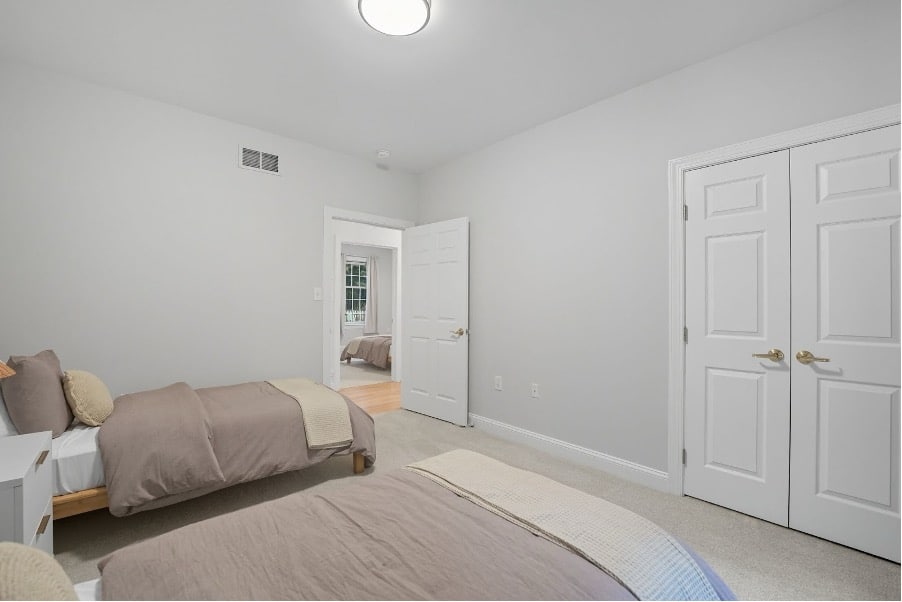
Key Takeaways
- Telehealth is transforming depression care by providing flexibility, comfort, and consistent access. Patients can engage in therapy from home, maintaining privacy while supporting steady progress.
- Virtual therapy removes barriers to care, making treatment more accessible, affordable, and private. Its adaptability helps patients maintain consistency, even during challenging times.
- Research shows telehealth is as effective as in-person therapy. Patients experience high satisfaction, comparable symptom improvement, and improved adherence to treatment plans.
- Virtual sessions are personal and interactive, combining secure video calls with digital tools to replicate the connection and engagement of face-to-face therapy.
- Mission Connection provides accessible, evidence-based mental health support that promotes long-term healing. Services are available online, in person, or through hybrid options to meet diverse needs.
How Telehealth is Transforming Depression Treatment
Depression treatment has evolved significantly with an increase in telehealth services. Virtual therapy connects patients with qualified professionals without needing to leave home, a major benefit for those struggling during severe episodes.
Telehealth offers video calls, phone sessions, and messaging, allowing flexible care based on preferences and access. Digital tools also support mood tracking, homework, and supplemental resources, extending therapy beyond traditional sessions.
There’s been a surge in telehealth use for depression, reflecting not just pandemic-driven necessity but recognition of its unique benefits for managing depressive disorders.
Mission Connection offers flexible outpatient care for adults needing more than weekly therapy. Our in-person and telehealth programs include individual, group, and experiential therapy, along with psychiatric care and medication management.
We treat anxiety, depression, trauma, and bipolar disorder using evidence-based approaches like CBT, DBT, mindfulness, and trauma-focused therapies. Designed to fit into daily life, our services provide consistent support without requiring residential care.
7 Proven Benefits of Telehealth for Depression Treatment
Virtual mental health services offer advantages for depression treatment that go beyond convenience, addressing barriers that have historically prevented many from seeking care during their most challenging moments.

1. Increased Access to Mental Health Care
Telehealth removes geographical barriers, connecting patients in rural or underserved areas with qualified specialists. Timely access is particularly critical for depression, where early intervention can prevent crisis situations. Patients can also find therapists who match specific needs, such as trauma-informed care or expertise in adolescent depression, without being limited by local availability, enabling more tailored and effective treatment.
2. Lower Cost Than Traditional Therapy
Telehealth often reduces session fees due to lower overhead costs and subscription-based models, making consistent care more accessible. Additional savings come from eliminating travel, parking, and time off work, which can be significant for patients already facing financial or energy-related challenges. These cost reductions remove practical obstacles that might otherwise prevent engagement in therapy.
3. Greater Privacy and Reduced Stigma
Virtual sessions protect patient privacy, eliminating the fear of being seen entering a therapist’s office. Being in a familiar home environment can make patients feel more comfortable discussing sensitive emotions, fostering more honest communication and a stronger therapeutic connection. This privacy can be particularly valuable in small communities or professional settings where stigma remains a concern.
4. Flexible Scheduling Options
Telehealth accommodates irregular energy levels and sleep patterns by offering evening or weekend appointments. Shorter check-ins between regular sessions provide additional support during difficult periods. This flexibility helps maintain consistent treatment, particularly for those experiencing depressive episodes that make sticking to rigid schedules challenging.
5. Comfortable Home Environment for Sessions
Engaging in therapy from home reduces anxiety and allows patients to participate in a space where they feel safe. Therapists gain valuable insight into a patient’s daily environment, which can inform more personalized interventions. Many report feeling more relaxed and open in home-based sessions, leading to deeper engagement and more productive therapy.
6. Reduced Travel and Wait Times
Telehealth eliminates the need to go through transportation, traffic, and parking, removing barriers that could prevent attendance. Virtual appointments tend to run more punctually, respecting patients’ limited energy and maintaining momentum in treatment. These efficiencies make therapy more accessible during low-energy periods.
7. Consistent Care During Life Transitions
Life changes such as moving, changing jobs, or traveling can disrupt traditional therapy. Telehealth allows patients to maintain the same provider, preserving trust and rapport, essential for effective depression management. Continuity of care reduces the risk of setbacks and ensures support remains available during vulnerable transitions.
What the Research Says: Effectiveness of Telehealth for Depression
Research consistently shows that telehealth interventions for depression deliver outcomes comparable to traditional in-person therapy. Multiple peer-reviewed studies report minimal differences in effectiveness, supporting telehealth as a legitimate first-line approach rather than just a substitute when in-person care isn’t feasible.
Clinical Outcomes Compared to In-Person Therapy
Randomized controlled trials show telehealth is as effective as in-person therapy for major depressive disorder. Telehealth also supports consistent engagement, early intervention, and uninterrupted care for patients facing mobility or schedule challenges.
Patient Satisfaction and Comfort
Telehealth users report high satisfaction and comfort discussing sensitive topics from home. A scoping review found virtual depression care enhances privacy and flexibility. Feeling safe at home improves openness, strengthens therapeutic rapport, and accelerates progress.
Therapy Completion and Adherence
Virtual care increases therapy completion and adherence. A study showed that telehealth interventions improve attendance and medication adherence. Reduced logistical barriers and the option for shorter check-ins help maintain treatment momentum, even when motivation is low.
How Telehealth Depression Treatment Actually Works
Telehealth depression treatment follows the same evidence-based principles as traditional therapy, adapted for virtual delivery. Sessions typically occur via secure video platforms, maintaining clinical standards while providing the flexibility of remote access. The therapeutic relationship remains central, with providers using familiar interventions in a digital setting.
Digital Tools and Extended Care
Many platforms integrate supplemental resources such as mood tracking apps, journaling features, and educational materials that reinforce therapy concepts. This creates a supportive ecosystem for depression management, often enhancing engagement compared to traditional care.
Types of Telehealth Services
- Video therapy: Mirrors in-person sessions with face-to-face interaction, maintaining visual cues and interpersonal connection.
- Text-based therapy: Offers flexibility and reflective processing, allowing patients to review past conversations.
- Medication management: Connects patients with psychiatrists or nurse practitioners for assessment, prescription, and monitoring, often integrated with therapy for coordinated care.
Session Structure and Interactive Features
Virtual sessions typically start with symptom check-ins, followed by collaborative problem-solving and therapeutic interventions. Providers often use screen-sharing to deliver worksheets, visual aids, or educational materials in real time, creating more interactive and memorable experiences than traditional formats.
Remote Assessment and Monitoring

Telehealth platforms use digital tools to track depression symptoms and progress:
- Digital mood tracking between sessions
- Automated symptom questionnaires (e.g., PHQ-9)
- Sleep and activity monitoring
- Medication adherence tracking
- Crisis response protocols with safety features
Medication Management via Telehealth
Virtual psychiatry appointments follow the same assessment and monitoring protocols as in-person visits. Many platforms integrate pharmacy delivery, improving access and adherence. Coordinated care between therapy and medication management enhances outcomes, and patients often report feeling more engaged in decisions about their treatment.
Who Benefits Most from Virtual Depression Care
While telehealth benefits most depression patients, certain populations gain particularly significant advantages. Understanding these groups helps providers and patients make informed treatment decisions. The accessibility and flexibility of virtual care allow for more personalized scheduling and intensity, supporting responsive care during critical recovery periods.
Rural and Underserved Communities
Telehealth is a lifeline for rural residents in mental health provider deserts, connecting them to specialists who would otherwise be inaccessible. Urban underserved communities also benefit, as virtual care eliminates transportation and time barriers that make in-person appointments challenging for those working multiple jobs or with limited public transit.
People with Mobility or Transportation Limitations
Individuals with physical disabilities, chronic conditions, or older adults with limited transportation access gain consistent access to care without travel stress. This convenience reduces appointment disruptions and supports ongoing engagement, improving outcomes for depression treatment.
Individuals with Busy Work or Family Schedules
Professionals and parents juggling demanding schedules benefit from telehealth’s evening, weekend, or on-the-go appointment options. The ability to connect from home, office, or while traveling ensures therapy remains accessible even during life’s busiest stages. For new parents experiencing postpartum depression, virtual care can be particularly crucial.
Those Experiencing Different Severity Levels of Depression
Telehealth supports patients across the spectrum of depression severity. For mild to moderate symptoms, early access promotes consistent engagement and may prevent worsening. For severe depression, virtual sessions allow patients who struggle to leave home to receive essential care in a safe and comfortable environment.
Practical Steps to Start Telehealth Depression Treatment
Beginning telehealth therapy for depression is straightforward. Start by researching services through insurance providers, online platforms, or healthcare referrals to find options that match your needs and preferences.
Initial Assessment and Provider Selection
Most platforms begin with an intake assessment to evaluate symptoms and treatment history, helping match you with a suitable provider. Look for licensed mental health professionals experienced in depression and evidence-based approaches like cognitive behavioral therapy or interpersonal therapy. Brief consultation calls can help assess communication style and compatibility, which strongly correlates with positive outcomes.
Insurance and Payment Options
Telehealth coverage has expanded, with many policies treating virtual sessions like in-person therapy. Verify benefits and network limitations with your insurer. For those without coverage, subscription models, sliding-scale fees, or membership packages make care more accessible and predictable.
Technology Requirements and Setup
A smartphone, tablet, or computer with a camera, microphone, and stable internet is sufficient for most sessions. Test your equipment and familiarize yourself with the platform beforehand; many services offer technical support or practice connections to ensure smooth sessions.
Creating a Private, Comfortable Space
Your environment matters. Choose a private space with minimal interruptions, use headphones, close doors, or add white noise to enhance privacy. Feeling safe and comfortable supports more productive and effective depression treatment.
Mission Connection: Accessible, Compassionate Mental Health Care
Finding effective, flexible mental health care can be challenging, but at Mission Connection, we make it easier by offering services designed to meet you where you are, whether in person, online, or through a combination of both.

Flexible Care Options for Every Lifestyle
We provide in-person, virtual, and hybrid outpatient mental health services specific to adults and young adults. Our programs address anxiety, depression, trauma, bipolar disorder, and other primary mental health diagnoses, ensuring care fits your schedule and lifestyle.
Evidence-Based and Personalized Treatment
Our clients benefit from evidence-based therapies such as Cognitive Behavioral Therapy (CBT), Dialectical Behavior Therapy (DBT), Eye Movement Desensitization and Reprocessing (EMDR), and Emotion-Focused Therapy (EFT), along with psychiatric care, medication management, and life-skills support. We combine individual, group, and experiential therapy to create treatment plans that meet your unique needs.
Telehealth Services for Greater Accessibility
Our virtual therapy options remove geographical and logistical barriers, connecting you with our licensed clinicians from the comfort of home. Telehealth allows you to stay consistent with care, maintain progress, and access support whenever you need it.
Commitment to Lasting Healing and Support
We focus on empowering you with the tools and skills needed for long-term mental wellness. Our compassionate team fosters connection, community, and a supportive environment so you feel understood and guided every step of the way.
Accredited, High-Quality Care Across Multiple Locations
We operate in California, Washington, and Virginia, providing accredited, evidence-based outpatient services. Over 95% of our clients report satisfaction with our care, appreciating our professional guidance, meaningful progress, and welcoming, empowering approach.
Call Today 866-833-1822.
Frequently Asked Questions (FAQs)
What makes telehealth a good choice for depression treatment?
Telehealth removes common barriers to care, like travel, scheduling, or stigma, making it easier to access consistent therapy. Many patients find the comfort of home enhances openness, engagement, and long-term progress.
What should I expect during my first telehealth session?
Your first session typically includes introductions, a review of your mental health history, and a discussion of treatment goals. You’ll collaborate with your therapist to create a personalized plan that supports long-term progress.
Can I get medication for depression through telehealth?
Yes, qualified prescribers can evaluate, diagnose, and prescribe depression medications virtually. Telehealth follows similar assessment, monitoring, and follow-up protocols as in-person care, often integrated with therapy for coordinated, comprehensive treatment.
How do I know if telehealth is right for my depression?
Telehealth suits most people, especially those with logistical or transportation barriers. Consider technology comfort, privacy, and schedule flexibility. Providers assess safety for severe cases and can coordinate higher levels of care if virtual treatment alone isn’t sufficient.
Can I combine telehealth with in-person sessions?
Yes, many providers, including Mission Connection, offer hybrid models that blend virtual and in-person sessions. This approach allows you to choose what works best for your schedule and comfort while ensuring consistent, quality care.








